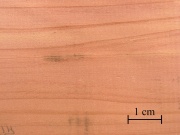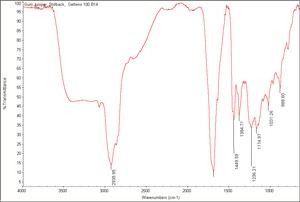Difference between revisions of "Juniper"
(username removed) |
|||
| (5 intermediate revisions by 4 users not shown) | |||
| Line 1: | Line 1: | ||
| − | [[File:Dragon.Chin.Juniper_PMAC.jpg|thumb|Dragon Chinese Juniper | + | [[File:Dragon.Chin.Juniper_PMAC.jpg|thumb|Dragon Chinese Juniper ''Juniperus chinensis'']] |
| − | |||
| − | ''Juniperus chinensis'']] | ||
== Description == | == Description == | ||
| − | A common name for evergreen trees in the cypress family. True juniper trees, such as ''Juniperus communis'', have dark purple berry-like cones that are used in cooking and medicine. Juniper wood is dense, brittle, and insect resistant. It is hard, smooth with a reddish-brown color. Because its aroma is thought to deter moths, juniper veneer is used for lining closets and storage chests. It is also used for turnery, pencil wood, and for the extraction of aromatic oils. Juniper oil and juniper tar are used in medicine, perfumes, and soaps. The bark, berries, and twigs of the red juniper have been used to produce a khaki color on [ | + | A common name for evergreen trees in the cypress family. True juniper trees, such as ''Juniperus communis'', have dark purple berry-like cones that are used in cooking and medicine. Juniper wood is dense, brittle, and insect resistant. It is hard, smooth with a reddish-brown color. Because its aroma is thought to deter moths, juniper veneer is used for lining closets and storage chests. It is also used for turnery, pencil wood, and for the extraction of aromatic oils. Juniper oil and juniper tar are used in medicine, perfumes, and soaps. The bark, berries, and twigs of the red juniper have been used to produce a khaki color on [[wool]] mordanted with [[alum]] and [[copper]]. Other junipers are: |
| − | |||
| − | |||
| − | |||
| − | |||
| − | |||
| − | |||
| − | |||
| − | |||
| − | |||
| − | |||
| − | |||
| − | |||
| − | |||
| − | |||
| + | * ''J. excelsa'' (Grecian juniper): native to southern Europe and southwestern Asia. | ||
| + | * ''J. drupacea'': native to Greece, Asia Minor, Syria, Lebanon. | ||
| + | * ''J. foetidissima'': native to Greece, Asia Minor, Lebanon. | ||
| + | * ''J. phoenicea'' (Phoenician juniper): widespread through the Mediterranean region. | ||
| + | * ''J. oxycedrus'' (prickly juniper): native to southern Europe and Iraq. | ||
| + | * ''J. virginiana'' (Eastern red cedar): native to the North America. | ||
| + | * ''J. Chinensis'' (Dragon Chinese Juniper): native to Asia. | ||
| + | * ''J. occidentalis'' (Western Juniper): native to western US. | ||
== Synonyms and Related Terms == | == Synonyms and Related Terms == | ||
| − | ''Juniperus communis; Juniperus excelsa'' (Grecian juniper); ''Juniperus drupacea; Juniperus foetidissima; Juniperus phoenicea'' (Phoenician juniper); ''Juniperus oxycedrus'' (prickly juniper); ''Juniperus virginiana'' (Eastern red cedar); ''Juniperus Chinensis'' (Dragon Chinese Juniper); | + | ''Juniperus communis; Juniperus excelsa'' (Grecian juniper); ''Juniperus drupacea; Juniperus foetidissima; Juniperus phoenicea'' (Phoenician juniper); ''Juniperus oxycedrus'' (prickly juniper); ''Juniperus virginiana'' (Eastern red cedar); ''Juniperus Chinensis'' (Dragon Chinese Juniper); genévrier (Fr.); enebro (Esp.); ginepro (It.); juniper resin; juniper oil; juniper gum; juniper tar |
| − | == | + | [[[SliderGallery rightalign|Gum Juniper, Stillback, Gettens 100.B14.TIF~FTIR(MFA)]]] |
| + | ==Physical and Chemical Properties== | ||
Juniper oil and tar is soluble in ethanol. | Juniper oil and tar is soluble in ethanol. | ||
| Line 34: | Line 27: | ||
|} | |} | ||
| − | == | + | ==Resources and Citations== |
| − | R.Gale, P.Gasson, N.Hepper, G.Killen, "Wood" in ''Ancient Egyptian Materials and Technology'', Cambridge University Press, 2000, p. 334-371. | + | * R.Gale, P.Gasson, N.Hepper, G.Killen, "Wood" in ''Ancient Egyptian Materials and Technology'', Cambridge University Press, 2000, p. 334-371. |
| − | = | + | * Schoch, W., Heller, I., Schweingruber, F.H., Kienast, F., 2004:[http://www.woodanatomy.ch/ Wood anatomy of central European Species]: Common Juniper,[http://www.woodanatomy.ch/species.php?code=JUCO Juniperus communis L.] |
| − | * | + | * F. H. Titmuss, ''Commercial Timbers of the World'', The Technical Press Ltd., London, 1965 Comment: 25-35 ppcf |
| − | * | + | * A.Lucas, J.R.Harris, ''Ancient Egyptian Materials and Industries'', Edward Arnold Publishers Ltd., London, 4th edition, 1962 |
| − | * ''Encyclopedia Britannica'', http://www.britannica.com Comment: "Juniper." | + | * ''Encyclopedia Britannica'', http://www.britannica.com Comment: "Juniper." Accessed 1 Sept. 2004. |
* ''Van Nostrand's Scientific Encyclopedia'', Douglas M. Considine (ed.), Van Nostrand Reinhold, New York, 1976 | * ''Van Nostrand's Scientific Encyclopedia'', Douglas M. Considine (ed.), Van Nostrand Reinhold, New York, 1976 | ||
| − | * | + | * Random House, ''Webster's Encyclopedic Unabridged Dictionary of the English Language'', Grammercy Book, New York, 1997 |
| − | * Art and Architecture Thesaurus Online, | + | * Art and Architecture Thesaurus Online, https://www.getty.edu/research/tools/vocabulary/aat/, J. Paul Getty Trust, Los Angeles, 2000 |
* ''CRC Handbook of Chemistry and Physics'', Robert Weast (ed.), CRC Press, Boca Raton, Florida, v. 61, 1980 Comment: density=35 ppcf (0.56 g/cm3) | * ''CRC Handbook of Chemistry and Physics'', Robert Weast (ed.), CRC Press, Boca Raton, Florida, v. 61, 1980 Comment: density=35 ppcf (0.56 g/cm3) | ||
Latest revision as of 14:02, 21 September 2022
Description
A common name for evergreen trees in the cypress family. True juniper trees, such as Juniperus communis, have dark purple berry-like cones that are used in cooking and medicine. Juniper wood is dense, brittle, and insect resistant. It is hard, smooth with a reddish-brown color. Because its aroma is thought to deter moths, juniper veneer is used for lining closets and storage chests. It is also used for turnery, pencil wood, and for the extraction of aromatic oils. Juniper oil and juniper tar are used in medicine, perfumes, and soaps. The bark, berries, and twigs of the red juniper have been used to produce a khaki color on Wool mordanted with Alum and Copper. Other junipers are:
- J. excelsa (Grecian juniper): native to southern Europe and southwestern Asia.
- J. drupacea: native to Greece, Asia Minor, Syria, Lebanon.
- J. foetidissima: native to Greece, Asia Minor, Lebanon.
- J. phoenicea (Phoenician juniper): widespread through the Mediterranean region.
- J. oxycedrus (prickly juniper): native to southern Europe and Iraq.
- J. virginiana (Eastern red cedar): native to the North America.
- J. Chinensis (Dragon Chinese Juniper): native to Asia.
- J. occidentalis (Western Juniper): native to western US.
Synonyms and Related Terms
Juniperus communis; Juniperus excelsa (Grecian juniper); Juniperus drupacea; Juniperus foetidissima; Juniperus phoenicea (Phoenician juniper); Juniperus oxycedrus (prickly juniper); Juniperus virginiana (Eastern red cedar); Juniperus Chinensis (Dragon Chinese Juniper); genévrier (Fr.); enebro (Esp.); ginepro (It.); juniper resin; juniper oil; juniper gum; juniper tar
Physical and Chemical Properties
Juniper oil and tar is soluble in ethanol.
| Density | 25-35 ppcf |
|---|
Resources and Citations
- R.Gale, P.Gasson, N.Hepper, G.Killen, "Wood" in Ancient Egyptian Materials and Technology, Cambridge University Press, 2000, p. 334-371.
- Schoch, W., Heller, I., Schweingruber, F.H., Kienast, F., 2004:Wood anatomy of central European Species: Common Juniper,Juniperus communis L.
- F. H. Titmuss, Commercial Timbers of the World, The Technical Press Ltd., London, 1965 Comment: 25-35 ppcf
- A.Lucas, J.R.Harris, Ancient Egyptian Materials and Industries, Edward Arnold Publishers Ltd., London, 4th edition, 1962
- Encyclopedia Britannica, http://www.britannica.com Comment: "Juniper." Accessed 1 Sept. 2004.
- Van Nostrand's Scientific Encyclopedia, Douglas M. Considine (ed.), Van Nostrand Reinhold, New York, 1976
- Random House, Webster's Encyclopedic Unabridged Dictionary of the English Language, Grammercy Book, New York, 1997
- Art and Architecture Thesaurus Online, https://www.getty.edu/research/tools/vocabulary/aat/, J. Paul Getty Trust, Los Angeles, 2000
- CRC Handbook of Chemistry and Physics, Robert Weast (ed.), CRC Press, Boca Raton, Florida, v. 61, 1980 Comment: density=35 ppcf (0.56 g/cm3)

